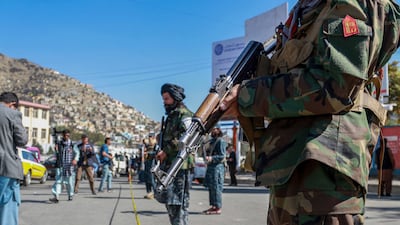Four people were killed on Wednesday in an explosion at a mosque close to the Taliban’s Interior Ministry in the Afghan capital Kabul.
Twenty-five people were also injured in the blast, which happened at 1.30pm, said ministry spokesman Abdul Nafee Takur. An investigation into the incident is ongoing.
No one immediately claimed responsibility for the explosion.
A Kabul hospital said the explosion was a suicide attack, Reuters reported. Taliban officials did not comment on the nature of the blast.
"The mosque was used by visitors and sometimes by Interior Ministry employees," the spokesman added.
The ministry is located in a highly-fortified compound next to Kabul's international airport.
Italian non-governmental organisation Emergency, which operates a hospital in Kabul, said it had received 20 patients "after a bomb attack in a mosque at the interior ministry".
"Two were already dead on arrival," it said on Twitter.
However interior ministry spokesman Abdul Nafy Takor said the explosion happened "in a mosque which is at a distance from the ministry of interior" where visitors and some employees pray.
The latest attack comes days after a suicide bombing at a Kabul education centre killed up to 52 people, more than twice the death toll acknowledged by Taliban officials, according to a tally compiled by AP.
Witnesses said the attacker blew himself up in the women's section of a gender-segregated classroom of a study hall in the Dasht-e-Barchi neighbourhood - an enclave of the historically oppressed Shiite Hazara community.
Dozens more were injured in Friday’s blast, making it one of the bloodiest attacks since the Taliban seized control of Afghanistan more than a year ago.
Since the Taliban takeover of Afghanistan in August 2021, ISIS, a rival of the Taliban, has carried out a series of attacks, including suicide bombings in crowded mosques.
The Taliban were also accused of plotting attacks on the Hazara community as they waged a two decade insurgency against the old US-led regime which collapsed last August.
The hardcore Islamists' return to power in Afghanistan last year brought an end to that insurgency and a dramatic decline in violence.
The Taliban movement -- made up primarily of ethnic Pashtuns -- has pledged to protect minorities and clamp down on security threats.


